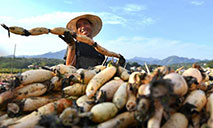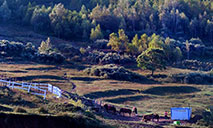Demographic development in Xinjiang self-explanatory against anti-China attempts, experts say
BEIJING, Sept. 29 (Xinhua) -- The population growth in China's Xinjiang Uygur Autonomous Region speaks for itself against such fabrications as "genocide," which are Western anti-China forces' attempts to interfere with China's development, foreign experts told Xinhua.
Their remarks came after China's State Council Information Office issued a white paper detailing the demographic development in Xinjiang on Sunday, which indicated that over the past 70 years, Xinjiang has seen rapid and steady population growth, with population quality, life expectancy, urbanization and modernization apparently improved.
Numerous facts and data demonstrated that Xinjiang, since 1949, has made a historical achievement in demographic development concerning the population quantity and quality, while people of various ethnic groups boast significantly ameliorated living conditions, life expectancy and education, noted Ghassan Youssef, a Syrian political expert and analyst.
"The white paper reveals a number of realities," said Aneel Salman, an economist at the Islamabad-based COMSATS University of Pakistan, noting the annual growth of the Uygur population in the region between 2000 and 2020 is higher than average growth rate of ethnic minorities in China.
Apart from the steady population growth, the past over 70 years also witnessed the improved quality of population, the speeding up of urbanization and the development of industries and tourism in Xinjiang, the economist told Xinhua.
Having seen storytellers "write so much about these so-called atrocities or genocide, but they have never been physical to this country," Salman condemned such practices, saying "that is pretty criminal."
Sonia Bressler, a French writer and sinologist, who has once traveled to Xinjiang, said she has seen the rapid progress in local economy, social stability and people's wellbeing, with the Chinese government's efforts to promote the inclusive development of ethnic groups, and protect their cultural traditions and religions.
By interviewing local residents and listening to their own stories, Bressler gained the knowledge of their enthusiasm to and trust in the country.
"I have been to Xinjiang eight times since 2005, and I have witnessed how Xinjiang has changed over the past 16 years," said Andrey Ostrovsky, head of the Center for Social and Economic Research of China of the Institute of Far Eastern Studies at the Russian Academy of Sciences.
Xinjiang has been developing very rapidly in recent years, said the expert, noting that "many mosques in Xinjiang" reflect the country's protection for the freedom of belief and religion.
Given the Uygur population in Xinjiang increasing by more than 3 million over the past 20 years, the alleged "genocide" of Uygurs makes no sense, the academic said, who asked "What kind of 'genocide' are we even talking about when the Uygur population of Xinjiang is constantly growing?"
Additionally, what is called "concentration camps" in the West is actually "not camps, but the places where people are able to master certain professions ... In the understanding of Russians, these are vocational schools," said Ostrovsky, recalling his visit in 2018 to a vocational school in Urumqi.
Photos
Related Stories
Copyright © 2021 People's Daily Online. All Rights Reserved.










